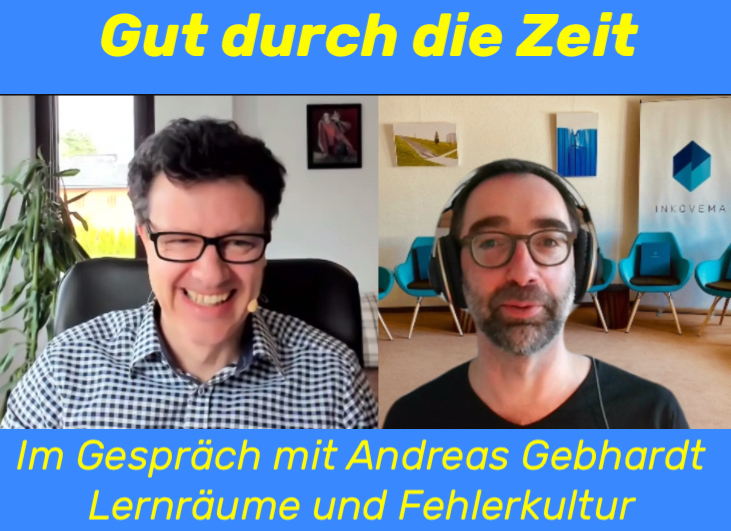INKOVEMA Podcast „Well through time“
#78 – Learning spaces and error culture
A mistake is better than none. In conversation with Andreas Gebhardt
Well through time. The podcast about mediation, conflict coaching and organisational consulting.
Andreas Gebhardt is a juggler and speaker. As one of the best jugglers in Germany, he has won national and international competitions and has performed for international audiences for twenty years, not only on all continents but also on the high seas. As a juggler, you love mistakes because you can't learn without them, and you hate them when they happen on stage.
CONTENTS
What does it take to learn something new?
- Mental attitude: willingness to make mistakes.
- Learning spaces: organisation to be able to learn from mistakes during rehearsals/learning.
- Frustration tolerance and enjoyment of learning.
What needs to be considered?
- The quicker I communicate a mistake, the more positively the people around me (team members, audience, etc.) react
- Transparency in dealing with mistakes is generally honoured.
- Errors are unintentional per se.
- Separate errors and people.
One mistake is better than none.
INTRODUCTION
Today it's all about mistakes. These things that once caused everyone a lot of trouble – and some still do today. This something that is no longer as bad today, as error and learning cultivators casually put it, but don't quite mean it when they talk about the cliché image of the aeroplane pilot who shouldn't make any mistakes.
Error, this consultant fetish, which today is functionalised and must serve as a springboard – for optimal optimisation, always keeping the higher, further, faster – no matter where – firmly in view.
Mistakes, that is quite clear, whether in the past or today, must not simply be allowed to be, but rather attract attention, focus attention, are a topic of conversation – especially in a world in which appreciation is both a value and an invitation.
That's why I want to tackle the topic of errors from a different angle today. Namely from the Expertise pageMistakes can and should have a competence-enhancing effect today. But how does this happen?
Competence, however, is not itself a personality trait, is – if you like – not a foot that you have or don't have, but rather a social attribution. Others determine whether we are competent. And this means that competence is highly uncertain, fragile and dependent on social processes.
So we are not competent per se, but are declared as such, labelled and treated accordingly.
And to get to the bottom of this, I have invited a special guest today who is a professional in a job where even laypeople can immediately identify, or think they can identify, every mistake.
I would like to welcome Andreas Gebhard, professional juggler and keynote speaker, to my virtual podcast studio
- HiStory: Gossamer Condor by Patrick McCreadyLearning also means making it possible to correct mistakes.
- Guest website: Andreas Gebhardt





Leave A Comment